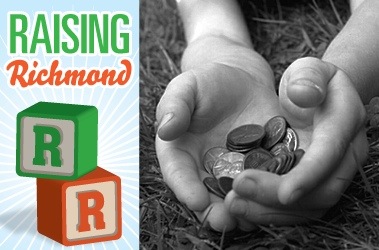Raising Richmond: money matters for kids
Teaching your child to be financially responsible is something that they will take with them into adulthood. However, teaching money smarts is easier said than done. So how do parents go about doing it well?

Hi, I’m Stephanie, Valerie’s college roommate and old friend. Although I don’t have kids yet I do take my godmother and honorary aunt duties quite seriously. While Val is on a well-deserved vacation I thought I’d share with you some thoughts I have about teaching kids about money. Experts say that age 10 is the time to illustrate managing money, but at any age the following principles hold.
— ∮∮∮ —
Save!
First off, saving is the name of the game. Americans are the worst at saving–see the recent financial crisis and its aftermath. Let’s try to raise the next generation to not make our mistakes. It is so simple that it gets overlooked, but don’t spend money you don’t have, and save for a rainy day–a rainy day that will probably happen. Incorporating small rewards and praise for a child that saves can help encourage good habits early on.
Life costs money
Right along with saving goes the need to pay for essentials. Your children should know that groceries don’t magically appear on the table. Let them know that things cost money, even the light they forget to turn off when they leave a room.
Making choices
Money is one of the top reasons that couples fight. Teach children early that there will be differences in opinion about how to spend (and save) money. Maybe dad would like to skimp on vacations to spend more at home, and maybe mom chooses to work extra hours to buy the family a new car. Money choices involve give and take, and it would do your kids well to know that finances aren’t black and white but require compromise like a lot of other adult matters.
Giving is important
Lead by example and let your kids know when and why you donate to others–the earlier the better on this one.
Don’t be scared
Many adults avoid diving into the daunting task of budgeting because they don’t want to face reality. Along with teaching your children that money isn’t always an easy issue to deal with, remind them that dealing with it is, nevertheless, a necessity.
Banks are a part of the system
Our parents taught us how to write checks and speak to the friendly neighborhood tellers, but today a more relevant conversation would be an explanation of debit and credit cards. Let your child help you conduct an ATM transaction. By the time they are old enough to have an account of their own the technical basics will be old hat!
Money is earned
Don’t hesitate to let your kids know why you go to work. The concept that money doesn’t grow on trees but has to be earned, is one that can be taught early and often.
Questions are welcome
As with anything, your children will probably have a lot of questions. Take the time to think about your answers and what else you can say to explain financial concepts. Even simple concepts like saving and spending can be overwhelming to a little one.
Read up
There are, of course, lots of resources to help explain money to your young ones. I think a fun one is One Cent, Two Cent, Old Cent, New Cent: All About Money by Bonnie Worth which includes a good dose of history on currency. Another informative pick is The Kids’ Money Book: Earning, Saving, Spending, Investing, Donating by Jamie Kyle McGillian.
Photo by: Pink Sherbet Photography
-
Recommend this
on Facebook -

Report an error
-

Subscribe to our
Weekly Digest




Notice: Comments that are not conducive to an interesting and thoughtful conversation may be removed at the editor’s discretion.